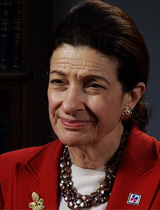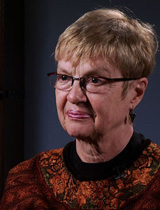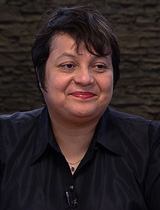Listen:
Experts working and studying political communication say if voters are not happy with the way the federal government is working, they have to change the system.
That’s the consensus from those who have tried serving in Congress, only to find it dysfunctional, and those working to solve the dysfunction, such as the Institute for Civil Discourse.
For years, the issue of partisan divides, incivility and lack of compromise among federal lawmakers has annoyed some people, but it eventually became such an issue for Olympia Snowe, R-Maine, that she quit the U.S. Senate.
Snowe specifically cited political gridlock as a reason she left Washington when her term ended in January 2013, after more than 30 years in Congress.
 Olympia Snowe, R-Maine, cited political gridlock as a reason she quit the U.S. Senate January 2013.
Olympia Snowe, R-Maine, cited political gridlock as a reason she quit the U.S. Senate January 2013.“Regrettably it’s only gotten worse, and I surmised when I made my decision…that it would not improve, at least in the short term, and that I could best contribute my voice in a different way other than being inside the institution where I didn’t think the change would occur,” she said this week.
Snowe is now working with organizations such as the Bipartisan Policy Center, and the National Institute for Civil Discourse.
The latter, based in Tucson, is trying to combat incivility by working with the public, the media and the politicians, said Carolyn Lukensmeyer, director of the National Institute for Civil Discourse.
Fixing from the Outside
Snowe, a self-described centrist Republican, said in her travels across the country since she left office more than a year ago, she’s heard concerns.
“So many people expressed to me their fears of this continuation of this political paralysis that prevents and impedes our nation from providing the solutions that are so essential to our country’s future,” she said.
To her, the fears are founded. Some of the policies on which the country’s social systems are built rely on bipartisan amendments and compromise to strengthen policy proposals, she said.
“You would not have had Social Security or Medicare or the Civil Rights Act, the Voting Rights Act, woven into the fabric of our country if they had been voted on purely partisan lines,” Snowe said.
“Bipartisan, legislative partnerships are absolutely crucial, if not indispensable to minimizing political barriers and maximizing the potential of Congress,” she said.
She wrote a book about the problems, and is proposing some policy changes, along with the Bipartisan Policy Center, that could help change discourse.
She suggested independent redistricting commissions redraw congressional boundaries every 10 years to account for population change. Congressional districts must be redrawn after every major U.S. Census, but some states allow elected politicians to do that. Snowe said that can lead to uncompetitive districts, where officials are inclined to vote and campaign to please the fringes of a party or position, rather than work toward centrism and political compromise.
Others states, such as Arizona, have redistricting commissions with members of assorted political leanings to try to eliminate partisanship from the process. Though the model is considered less politically-influenced, Arizona’s commission has been accused of applying partisan opinion to the process of reshaping districts.
That said, more states should move to an independent redistricting model, Snowe said. She is also recommending all states allow independent voters to weigh in on primaries. That’s allowed in Arizona because the state Republican and Democratic parties have permitted it, but that’s not the case in all states, she added.
Ultimately, whatever is done must be to further the goal of making sure public opinion is represented in government, she said.
“It doesn’t matter if people are on the right or the left, at the end of the day they want their government to function and they want it to work,” Snowe said. “What they’ve witnessed is a dysfunctional Congress, and the inability of the congress and the president to work together to make decisions large or small for the good of the country.”
 Carolyn Lukensmeyer, director of the National Institute for Civil Discourse.
Carolyn Lukensmeyer, director of the National Institute for Civil Discourse. But that doesn’t mean the public should lose hope, she said.
“The worst thing that can happen for our country is that people despair so much that they withdraw and retreat, they don’t’ vote, they don’t become involved they are not engaged,” she said. “I just want to assure them that we can change this political climate that we must that this is an aberration and not a trend.”
Three-Pronged Solution
The National Institute for Civil Discourse is trying to reduce partisan gridlock by working with three groups: the lawmakers, the public and the media.
“We focus on how incivility has increased in our culture, certainly in politics and government, but in everyday life, and the whole issue of how incivility has made government dysfunctional,” Lukensmeyer said.
“The way we describe it is that we really need to shift things in our country so that once again elected officials are taking on the big issues facing the country instead of letting hyper-partisanship mean they don’t get anything done,” she said.
With elected officials, the institute is trying to train state lawmakers to work with one another, by proving that it is a more effective strategy for accomplishing policy goals, Lukensmeyer said.
At the federal level, the institute is fostering a program where two members of different parties in the U.S. House visit each other’s districts and hold meetings with constituents.
The events are to allow the public “to see a Republican member of Congress, working with a Democrat member of Congress, really tackle an issue together.”
To weigh progress, the institute plans to calculate how successful elected officials are at introducing and passing legislation sponsored by more than one political party. Those measurements are being taken now.
“And we will then make a comparison after we’ve done the work,” she said.
The institute also held a session with political reporters to get them to brainstorm how they can help change the public discourse about politics.
“We’re also focused on a media that really informs, and is fact-based,” she said.
The reporters came up with ways they may change their actions, such as focusing on how the issues brought up during an election cycle could affect voters, rather than just focusing on the horse race, Lukensmeyer said.
Additionally, she said the institute is holding forums on political issues such as mass shootings to try to get people to see the issue broadly, rather than strictly as a second amendment issue, she said.
“So many Americans are angry about what’s happened in government and politics and even ashamed at what’s happened in government and politics, and yet they don’t feel any way to really make a difference,” Lukensmeyer said.
Analyzing the Root of the Problems
Norma Mendoza-Denton wrote one of two grant proposals the National Institute of Civil Discourse funded in 2012. She wanted to study the dialogue of disagreement during town hall meetings, starting in Southern Arizona.
 Norma Mendoza-Denton wrote one of two grant proposals the National Institute of Civil Discourse funded in 2012.
Norma Mendoza-Denton wrote one of two grant proposals the National Institute of Civil Discourse funded in 2012. Mendoza-Denton had already spent the early part of the turn of the century attending town hall meetings then-U.S. Rep. Jim Kolbe, R-Tucson held to meet with constituents. So she had personal experience and video footage when she applied for the grant to turn the experiences into something that could inform others.
She also studied the language and emotion used in town halls former U.S. Rep. Gabrielle Giffords, D-Tucson held, and some with New York City’s former mayor, Republican Rudy Guliani.
She found noticed politicians didn’t always know how to handle an upset member of the audience. Their efforts to control the situation weren’t always effective, she said.
“Sometimes a constituent would get very frustrated and argumentative about something, and the representative would say, ‘Calm down, calm down,’ and that would get people really inflamed because the assumption behind saying 'calm down' is that you’re not being rational,” Mendoza-Denton said.
She also noticed several of the members of the public at the town halls had misdirected anger. She said she saw participants who were upset the elected official wasn’t doing something, even though that person had no ability to solve the problem. Mendoza-Denton said people need to know what to expect at town hall meetings.
In Arizona, she said, the people who show up at town hall meetings tend to come already upset about something.
“We have a loose system where people come to express their concerns, that's the nature of the kind of town hall meeting in Arizona often it's conflictive,” she said.
“I think that representatives and constituents would benefit from some type of discourse analysis training,” she said.
Sometimes preparation, such as a briefing before the town hall, can also help.
At presidential debates, “someone tells us a town hall meeting is about all of us about expressing our different opinions and perhaps agreeing to disagree,” she said.

By submitting your comments, you hereby give AZPM the right to post your comments and potentially use them in any other form of media operated by this institution.